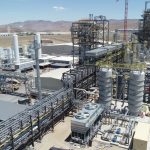Spanish airline group Iberia has partnered with Madrid-based global energy company Cepsa to research, develop and procure sustainable aviation fuels, and to explore other low-or-no-emission energy sources including renewable hydrogen and electricity to power ground service vehicles and aircraft tugs at airports. Cepsa will develop “on a large scale” SAF produced from waste, recycled oils and sustainable plant-based feedstock, while providing Iberia and its low-cost sibling Iberia Express with “preferential access” to the fuels, reports Tony Harrington. “This alliance illustrates our commitment to sustainability and our strong resolve to support our customers by providing them with viable solutions that accelerate their energy transition,” said Maarten Wetselaar, Cepsa’s newly-appointed CEO. “As a leader in the supply of fuels to the airline industry, we share with the Iberia Group the common goal of promoting the decarbonisation of transport as a tool in the fight against climate change.”
Sustainable aviation fuel is a core element of Iberia’s broad-based environmental strategy, says the airline, which also includes aircraft fleet renewal, greater fuel efficiency, elimination of single-use plastics on flights, improved waste management and increased use of digital processes. Iberia’s parent company, International Airlines Group, which also owns British Airways, Aer Lingus and low-cost carriers Vueling and Level, has committed it will reduce net CO2 emissions by 20% between 2019 and 2030, while the oneworld airline alliance, of which Iberia and British Airways are members, is targeting by 2030 that 10% of the collective fuel volumes of its 14 member airlines will comprise SAF.
In a joint statement, Iberia and Cepsa said: “The development of sustainably-sourced aviation fuels is a priority for moving towards an increasingly low-carbon industry and contributing to the achievement of the 2030 agenda.” They said their partnership, which will include SAF research and flight testing, would also contribute to three of the key sustainable development goals set by the United Nations – goal 7, to “ensure access to affordable, reliable and modern energy services”, goal 8, to “promote inclusive and sustained economic growth, employment and decent jobs”, and goal 13, to “take urgent action to combat climate change and its impacts.”
Additionally, the Iberia-Cepsa collaboration is intended to align with the European Commission’s ‘Fit for 55’ climate agenda, which includes the ‘ReFuelEU Aviation’ initiative, designed to increase supply of and demand for aviation biofuels in the European Union by proposing SAF blending mandates of at least 2% by 2025, 5% by 2030, and 63% by 2050.
“To decarbonise the aviation sector, the development, production and distribution of sustainably-sourced fuels at affordable prices, and in sufficient quantity to supply airlines, is essential,” said Iberia CEO Javier Sanchez-Prieto. “We are confident that this agreement with Cepsa will contribute to that goal.”
The CEO of Iberia Express, Carlos Gomez, added: “It is time to create synergies between companies that have the same objective: developing our business and operations while minimising our environmental impact. This agreement is an important step on our path towards more sustainable air transport.”
Cepsa has two well-resourced global shareholders to help fund SAF development: Mubadala Investment Company, which is wholly-owned by the Abu Dhabi government, and US-based global private equity company The Carlyle Group. Together, they manage global assets valued at more than $536 billion.
“With this agreement,” said Cepsa and Iberia of their partnership, “the airline secures preferential access to a scarce fuel (biojet), and a competitive advantage for both customers and investors, thanks to better ratings on sustainability indexes. Other benefits include boosting the circular economy, increasing energy independence and ensuring an important driver of the Spanish economy. In addition, these fuels can be used immediately with existing supply infrastructures and without the need for fleet renewals.”
The reference by Cepsa and Iberia to investor sustainability ratings is clear acknowledgement of the growing attention being paid by investors and major fund managers to corporate sustainability programmes and outcomes, as consumers increasingly factor into their purchases the environmental action strategies of suppliers. Late last year, aviation data group CAPA and carbon reduction consultancy Envest Global produced The Airline Sustainability Benchmarking Report, which found corporations, and increasingly individual consumers, were sourcing their air travel not just based on typical features such as price and schedule, but also on the climate action strategies and performance of specific airlines (see article). The report highlighted climate activism by shareholders and investors as “an existential threat” to airlines with poor sustainability strategies, and warned that “multiple airlines” could fail in the next three to five years if they did not demonstrate meaningful commitment to decarbonising their operations.
Photo: Iberia












More News & Features
SAF One announces new investment and technology partners for Middle East SAF project
New studies confirm minor flight re-routing to avoid contrails would have major climate benefits
New initiative formed to accelerate SAF adoption and production in the Pacific Northwest
EcoCeres opens new Malaysia production facility as SAF ambition in Asia scales up
Aviation, shipping and fuel leaders convene in Rotterdam to accelerate sustainable fuels scale-up
EU SAF mandates will have to be revised, predicts French oil chief